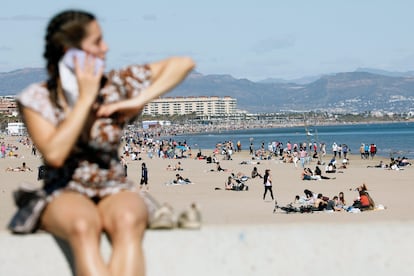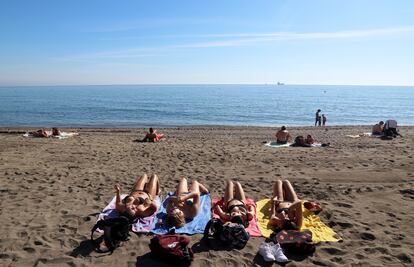New law introduces stricter face mask rules in Spain
Described as ‘obsolete’ at a meeting of health officials, the legislation has triggered some angry reactions, with the Balearic Islands saying the mandate will not be applied on their territory

Social distancing will no longer be a determining factor for wearing a face mask in Spain. On Tuesday, the government published a law in the Official State Gazette (BOE) making masks mandatory in all public spaces regardless of the distance between people.
The measure immediately raised questions among some regional officials, some of whom reacted defiantly at the news. The government of the Balearic Islands on Wednesday said that the law would not be enforced on its beaches and swimming pools.
Shortly after the law’s publication in the BOE, the government admitted that the guidelines, which build on a decree passed in June of last year, may have been overtaken by today’s reality and improved knowledge about the coronavirus.
On Wednesday morning, central and regional health officials held a meeting and agreed to analyze ways to change a law that several participants described as “obsolete” in many ways, according to sources familiar with the gathering.
“I hope that between now and the next meeting [of the Inter-Territorial Council] we will have found some space to apply this law in the most harmonized way possible,” said Health Minister Carolina Darias at a news conference. “Face masks are mandatory, but we have to see whether the law leaves some room for maneuver.”
What the law says
“People from the age of six and older have the obligation to wear masks [...] on public streets, in outdoor spaces and in any closed space that has a public use or is open to the public,” reads the BOE announcement published on Tuesday.
Until now, the coverings were only mandatory in public and outdoor spaces when it was not possible to keep a distance of 1.5 meters or more between people. These rules were part of a decree issued by the government in June 2020, when the state of alarm ended and a three-month lockdown was lifted.
On Tuesday afternoon the government updated its information website to reflect the fact that masks are now to be used “always” in the settings mentioned in the BOE, instead of just when there is no safe distance.
Until now, regional governments were free to adapt these rules as they saw fit, and many did so immediately after they came out. Some regions made masks mandatory at all times, but introduced exceptions for certain situations, such as going to the beach.
But under the newly published law, which replaces the June decree, regional governments may no longer introduce changes. Instead, everyone is bound by the same regulations, which make masks mandatory at all times, including at the beach or the local swimming pool, and even when there is a safe distance between people. The move could further harm the tourism industry, which has been dragged down by a year of coronavirus pandemic.

Regional response
Some regional governments did not seem affected by the news, while others were defiant.
On Wednesday, the government of the Balearic Islands, a popular tourist destination, announced that masks will not be mandatory at beaches and swimming pools in its territory, claiming that the new national law does not override its own regional legislation. According to health chief Patricia Gómez, “there is a sentence in the national law that mentions ‘in conformity with the health authorities.’ Our legal services feel that our legislation is not superseded by the national one, and our own measures will remain in force.”
Sources in the executives of Galicia and the Valencia region noted that face masks are already mandatory in all open and public spaces on their territory, even while suntanning on a towel on the beach. For them, the law does not represent any great change.
But in Andalusia the tension was palpable. Juan Marín, the deputy premier of the southern region, said he did not understand “this type of decisions that get made without consulting with the regions.”
And sources in the governments of Catalonia and the Canary Islands said that their legal services are already analyzing the law to determine their next steps.
Superseded
Government spokesperson María Jesús Montero admitted on Tuesday that there’s been “a time lag” between the publication of the law and “a reality that’s already been superseded,” alluding to last summer, when the original decree was drafted.
Legal experts consulted by this newspaper said that modifying an existing law could only be done with a new law which in turn would require the usual parliamentary proceedings, or else with a government decree approved via fast-track procedure. In other words, it would not be enough for the executive and regional officials to come to an agreement on changes to the law at Wednesday’s meeting.
The face mask rules were originally part of a decree issued in June, and they began to be implemented immediately, with provisions made for regional adaptations. Later, the text was drafted as a regular bill that made its way through parliament and is only now being formally enacted into law.
The change in criteria, which originally allowed people to go unmasked provided they kept a safe distance from one another, is due to an amendment introduced in the Senate that said masks should be worn at all times regardless of distance. The amendment was introduced by lawmakers from the Socialist Party (PSOE), who considered it “a technical improvement” based on scientific evidence about the spread of the coronavirus through aerosols.
Exceptions
As it stands now, the law makes exceptions for people with medical conditions or respiratory problems that could be made worse through the use of masks, as well as for those with a disability that would make it hard for them to remove their own mask.
It also lets people exercise outdoors individually without a mask, and considers further exceptions in unspecified situations of “force majeure,” as well as “activities that are incompatible with its use.” Legal experts believe that this latter exception is general enough that it might conceivably be used as a way to introduce some slack into a rule that many now see as excessive.
The new law regulates several other pandemic-related issues, and will remain in effect “until the government declares an end to the health crisis created by Covid-19, based on reasoning and scientific evidence.” Violators can be fined up to €100 for not wearing a mask.
English version by Susana Urra.
Tu suscripción se está usando en otro dispositivo
¿Quieres añadir otro usuario a tu suscripción?
Si continúas leyendo en este dispositivo, no se podrá leer en el otro.
FlechaTu suscripción se está usando en otro dispositivo y solo puedes acceder a EL PAÍS desde un dispositivo a la vez.
Si quieres compartir tu cuenta, cambia tu suscripción a la modalidad Premium, así podrás añadir otro usuario. Cada uno accederá con su propia cuenta de email, lo que os permitirá personalizar vuestra experiencia en EL PAÍS.
¿Tienes una suscripción de empresa? Accede aquí para contratar más cuentas.
En el caso de no saber quién está usando tu cuenta, te recomendamos cambiar tu contraseña aquí.
Si decides continuar compartiendo tu cuenta, este mensaje se mostrará en tu dispositivo y en el de la otra persona que está usando tu cuenta de forma indefinida, afectando a tu experiencia de lectura. Puedes consultar aquí los términos y condiciones de la suscripción digital.








































